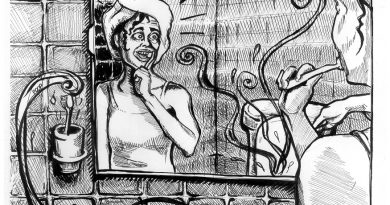Students Implement On-Campus Sustainability
Sustainability in Action (TESC 301) is a course that challenges students to plan and implement environmental sustainability on the UWT campus.
This course counts towards the Sustainability minor, as a capstone for Environmental Studies, and as an elective. This quarter, Interdisciplinary Arts & Science (IAS) faculty member, Kim Davenport, is teaching the class and guiding students on their way to implementing environmental change.
“We take field trips around campus and to some other external sites just to think about sustainability issues in general. Then we have staff from our facility services come in and talk to the students about some current issues in connection with the campus. That’s often where a lot of students get their ideas,” says Davenport.
Students first walk the entire campus to familiarize themselves with each building.
“One thing I noticed is we have a lot of commuter students. You come, you park, you go to class, and then you leave. And so a lot of students, even if they’ve been here for years, don’t know about every single building and they haven’t necessarily thought about the whole campus,” says Davenport.
While walking the campus, students are told to be wary of excessive electricity consumption, water use, lack of recycling, etc. Students then go to the Center of Urban Waters where they get to witness an energy and water efficient building where they are able to obtain ideas for their future project.
Lastly, they visit the Tacoma Recovery and Transfer Station where staff members explain how the city of Tacoma recycles, how they deal with garbage, and where they send things that go to the landfill.
Students aren’t the only trend-setters formulating ideas. The Committee on Sustainability consists of faculty, staff, and students who meet all year around and create sustainable project ideas for the campus as well.
“When this course first started there wasn’t any sort of organization around that [sustainability] at all. Someone would just have a pet project and they’d try to run with it and see what happens,” says Davenport.
After the students are done with their projects, they present them to the Committee on Sustainability, who can implement a project on campus, if found beneficial.
Kris Farren, a student enrolled in TESC 301, is currently working on her group project, Dawgs Unplug. The project focuses on plug loads on campus and conserving electricity.
“We feel really good about the project. It is an issue on campus that should be addressed that affects students, faculty and staff. It is no different than how you conserve electricity at your home with reducing usage and unplugging unused devices. [These devices] continue to use electricity because of no off switch, power levels or modes… Unplugging or turning off helps reduce electricity costs and carbon emissions for a sustainable future,” says Farrens.
Dawgs Unplug isn’t the only group project. Groups have formed other project ideas such as reducing landfill size by recycling nitrile gloves, and having the campus collectively create reusable UW aluminum bottles to reduce the use of plastic water bottles.
At the end of the quarter, students will find out if their project will soon bring change to campus.





